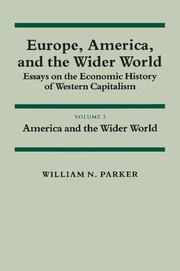Book contents
- Frontmatter
- Contents
- Editors' preface
- Preface
- Acknowledgments
- A note on notes
- PART I AMERICA AND EUROPE: A HISTORY
- PART II THE SOUTH IN SLAVERY AND IN FREEDOM
- PART III CAPITALIST DYNAMICS OF THE RURAL NORTH
- 7 Breakthrough to the Midwest
- 8 Migration and a political culture
- 9 Technological knowledge: reproduction, diffusion, improvement
- 10 The true history of the northern farmer
- PART IV THE NORTH: DYNAMICS OF AN INDUSTRIAL CULTURE
- PART V AMERICAN VALUES IN A CAPITALIST WORLD
- ANNEXES
- Index
7 - Breakthrough to the Midwest
Published online by Cambridge University Press: 06 December 2010
- Frontmatter
- Contents
- Editors' preface
- Preface
- Acknowledgments
- A note on notes
- PART I AMERICA AND EUROPE: A HISTORY
- PART II THE SOUTH IN SLAVERY AND IN FREEDOM
- PART III CAPITALIST DYNAMICS OF THE RURAL NORTH
- 7 Breakthrough to the Midwest
- 8 Migration and a political culture
- 9 Technological knowledge: reproduction, diffusion, improvement
- 10 The true history of the northern farmer
- PART IV THE NORTH: DYNAMICS OF AN INDUSTRIAL CULTURE
- PART V AMERICAN VALUES IN A CAPITALIST WORLD
- ANNEXES
- Index
Summary
Up to a point, the history of American economic development may be plausibly organized around sequences of physical “opportunities,” continuously refreshed from one natural source after another. But such an interpretation lays yet further obligations on the interpreter. For “opportunity” is an equivocal word, with a decided human and social content. What may appear to one human group as opportunity may appear to another as abomination or, more likely, may lie for centuries wholly unobserved. How then did the American population maintain almost from the beginning so quick a recognition of economic opportunity and so ardent and organized a response to the possibilities offered by the continent as settlement crept, or rushed, across it?
To understand the history of the social response for any group, one must begin at some point with certain antecedent social conditions. Specifically and most importantly for the understanding of modern economic growth, a mercantile community must be located, embryonic in a society or touching it from outside, a community with motivations and techniques at least partially developed, able to recognize a trading opportunity as such and to bring it to life. For that to happen it is necessary that that community be encased in a political apparatus that allows it to flourish. The managers of that apparatus must see some benefits in the wealth that the merchants may acquire and stand ready to protect, encourage, even subsidize their operations.
- Type
- Chapter
- Information
- Europe, America, and the Wider WorldEssays on the Economic History of Western Capitalism, pp. 103 - 114Publisher: Cambridge University PressPrint publication year: 1991

